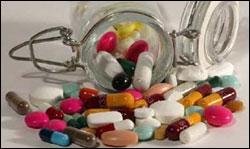
At the previous hearing on the issue last Wednesday, SC had said: "While adjourning the case, we make it clear that the government should not alter the price structure of the drugs as notified vide Notification dated 13.07.1999 and similar notifications which may have been issued thereafter." The next hearing is on the coming Tuesday.
The court had wanted the government to inform it on when a notification expanding the span of existing price control on 74 bulk drugs to 348 essential medicines would be issued.
However, last month, the Group of Ministers (GoM) asked by the Union Cabinet to formulate a new National Pharmaceutical Pricing Policy had decided to propose a new pricing mechanism to cap the prices of 348 essential medicines on a formula different from the existing one.
Currently, the prices of 74 bulk drugs used in making formulations are capped on a cost-plus mechanism. This means there is a ceiling on prices of all medicines that contain one or more of these bulk drugs and companies are not allowed to raise these prices on their own.
For all other medicines, drug makers are allowed to increase prices only up to 10 per cent annually; for anything beyond that, they need permission.
However, the GoM's proposed formula is to cap the prices of each of the 348 essential medicines at the weighted average price of drugs with more than one per cent market share. The Cabinet is yet to approve this.
In a recent letter to D S Kalha, secretary, department of pharmaceuticals (DoP), reviewed by Business Standard, Additional Solicitor General Sidharth Luthra said the DoP needed to inform the apex court about the "requirement to amend the mechanism for price fixation and the difficulties that arose consequent to Drugs Price Control Order, 1995...appropriate to file a detailed affidavit setting out the benefits to the citizens that may be brought in by a change/mandate/updated policy/DPCO..."
The
"We are in business and we would not like to make products on which we make losses. If companies stop manufacturing products that are under the list of essential medicines, what would happen to patients?" asks D G Shah, secretary general of the Indian Pharmaceutical Alliance, a group representing major domestic pharma companies.
GlaxoSmithKline, Pfizer, Cipla, Ranbaxy and Cadila are among the top manufacturers of these 348 medicines. The domestic pharmaceutical market is estimated to be at around Rs 67,000 crore annually. Going by Indian Pharmaceutical Association estimates, the 348 medicines listed as essential and likely to come under price control contribute around Rs 18,000 crore to the total sales.
If the GoM recommendations come into force, the pharmaceutical industry is set to lose around 15 per cent of this Rs 18,000 crore yearly revenue. Going by the SC directive, if prices of 348 medicines are capped on the current cost-plus formula, 55 per cent of the total revenues from these drugs would be impacted, Shah said.









 © 2025
© 2025